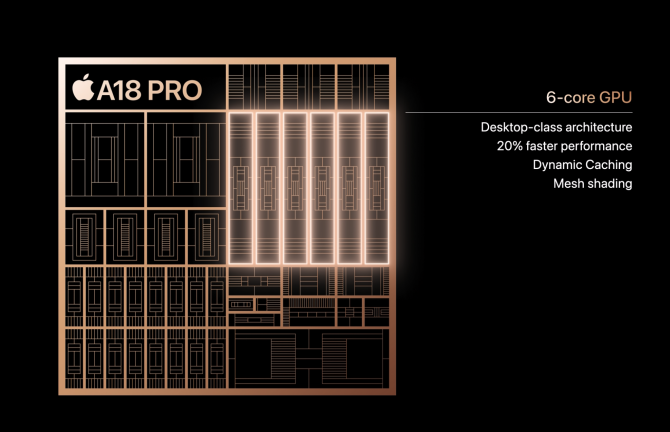Apple’s iPhone 16 lineup features second-generation 3nm chips, likely using TSMC’s N3E process. This offers improved efficiency and performance over previous versions. The new Pro models have larger displays and thinner borders. Camera upgrades include a 48MP Fusion camera, 48MP ultra-wide camera, and 5´ telephoto on both Pro models. Video capabilities now include 4K 120 fps recording with adjustable playback speeds. The A18 Pro chip enables advanced color grading and ProRes workflows. Apple Intelligence features, which will be developed later, will enhance visual recognition and information-gathering capabilities.

In Apple’s livestream, the company mentioned that the iPhone 16 lineup uses second-generation 3nm chips. However, from the M4 launch in May, it’s clear that Apple is now utilizing a refined version of TSMC’s most advanced 3nm process for these chips. This indicates an improvement in efficiency and performance over previous versions. Last year’s iPhones used TSMC’s N3B node, so we assume these new iPhones are using TSMC’s N3P, an optical shrink of the current-generation N3E process that is expected to offer better performance efficiency and transistor density than the N3E.

The new Pro lineup features the thinnest borders of any Apple product and introduces larger display sizes: 6.3 inches on the iPhone 16 Pro and 6.9 inches on the iPhone 16 Pro Max—the largest iPhone display ever.
Buy the camera, get a phone for free
The iPhone 16 Pro and iPhone 16 Pro Max feature a 48MP Fusion camera, a 48MP ultra-wide camera, and a 5´ telephoto camera, now available on both models. Users can record 4K video at 120 fps in Slo-mo or Video mode and adjust the playback speed in the Photos app, with options for quarter-speed, half-speed, and fifth-speed, equivalent to 24 fps. With the A18 Pro’s new image signal processor (ISP), frame-by-frame color grading is possible for 4K 120 fps video in Dolby Vision. Additionally, 4K 120 fps ProRes and Log footage can be captured directly to external storage for more efficient professional workflows.

Later this year, the iPhone’s Camera Control will enhance what Apple is calling visual intelligence to allow users to gather information about objects and locations quickly. By holding down Camera Control, users can access details such as a restaurant’s hours or ratings, add event information from a flyer to their calendar, or identify a dog’s breed. Camera Control will also integrate with third-party tools like Google for purchasing items or ChatGPT for problem-solving, with users controlling when these tools are used and what information is shared. Apple Intelligence will be available as a free software update. The first set of Apple Intelligence features will be available in beta next month as part of iOS 18.
Apple reports that its second-generation 3nm process provides a 20% performance increase for the GPU and a 15% increase for the CPU. This advancement is part of Apple’s ongoing efforts to enhance the capabilities of its chips, aiming to deliver improved speed and efficiency across its devices. The new architecture is expected to significantly benefit various applications, reinforcing Apple’s commitment to innovation in its silicon technology.
SMC’s second-generation 3nm chips, also known as N3E, offer several improvements over the previous generation, including:
- Faster transistors: N3E chips have faster transistors, which enable quicker processing of information.
- Increased efficiency: These chips are more power-efficient, which leads to longer battery life and reduced heat generation.
- Higher transistor density: N3E chips have a higher transistor density, allowing for more processing power in a smaller area.
- Wider process window: N3E offers a wider process window, resulting in better yields and reduced manufacturing complexity.
- Improved performance: N3E chips provide an 18% increase in performance compared to the previous generation.
- Reduced power consumption: These chips consume 32% less power than the previous generation.
These advancements make TSMC’s second-generation 3nm chips state of the art, and once again,
The iPhone 16 Pro and iPhone 16 Pro Max will be available in black titanium, natural titanium, white titanium, and desert titanium, in 128GB, 256GB, 512GB, and 1TB storage capacities. Pricing for the iPhone 16 Pro starts at $999, and the iPhone 16 Pro Max starts at $1,199.